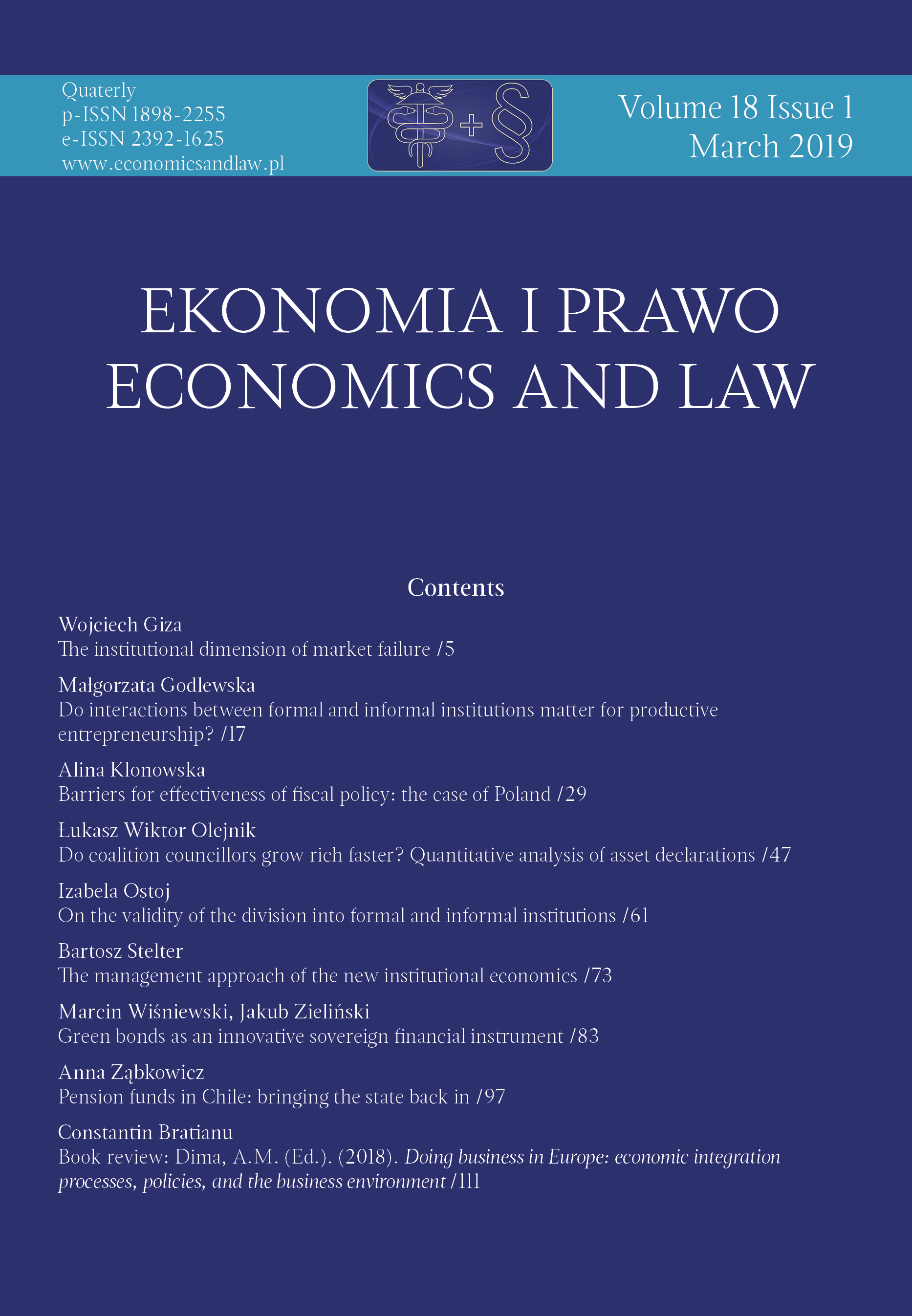The management approach of the new institutional economics
DOI:
https://doi.org/10.12775/EiP.2019.006Keywords
utility management, the concept of O.E. Williamson, the concept of R. Coase, transaction costs, agency theory, multi-divisional formAbstract
Motivation: The role of corporations in the modern economy is extremely important, in addition, the widely observed oligopolistic markets gave birth to the need for the formulation of the theoretical concept of undertaking explanatory way of large companies, with particular emphasis on the basic objective of the company and the role they play in the markets. The aim of the work is to present alternatives to the traditional neoclassical concept of enterprises, management theory and their critical assessment, as well as an indication of the application values of managerial recognition proceedings of enterprises with an emphasis on the form of its operation. In this work there were presented mainly the views of O.E. Williamson, on the aggregate concept of operation of the company in the light of the theory of transaction costs.
Aim: The aim of the article is the analysis of enterprise under the new institutional economics in respect of management science, and to show the intermingling of economics and management, and an attempt to justify the need of their connection. In the article there has been used the world literature and it has been examined for adequacy and being up-to-date to the theme proposed in the article.
Results: Most of the discussion in the mainstream of new institutional economics provides indications on the ways and means of raising the efficiency of the sector by striving to achieve aka the institutional balance. New institutional economics offers a fresh look at the decision-making process in organizations; it shows the complexity of this process and indicates the items that have not been previously included, and whose role in this process can be significant. Institutional analysis applies to phenomena and processes, which occur in organizations and its use can lead to beneficial results for them.
References
Barney, J.B. (1991). Firm resources and sustained competitive advantage. Jour-nal of Management, 17(1). doi:10.1177/014920639101700108.
Barney, J.B. (2007). Gaining and sustaining competitive advantage. Upper Saddle River: Prentice Hall.
Barney, J.B., & Hesterly, W.S. (2010). Strategic management and competitive advantage: concepts and cases. New Jersey: Prentice Hall.
Boehlke, J. (2010). Firma we współczesnej myśli ekonomicznej: studium teoretyczno-metodologiczne. Toruń: Wydawnictwo UMK.
Buchanan, J.M. (1991). Economics in the post-socialist century. The Economic Journal, 101(404). doi:10.2307/2233831.
Bustamante, A.V. (2016). U-form vs. M-form: how to understand decision autonomy under healthcare decentralization? Comment on decentraliza-tion of health services in Fiji: a decision space analysis. International Journal of Health Policy and Management, 5(9). doi:10.15171/ijhpm.2016.73.
Chandler, A.D. (1977). The visible hand: the managerial revolution in American business. Cambridge: Harvard University Press.
Davidson, S., De Filippi, P., & Potts, J. (2016). Disrupting governance: the new institutional economics of distributed ledger technology. SSRN Elec-tronic Journal. doi:10.2139/ssrn.2811995.
Dorobantu, S., Kaul A., & Zelner, B. (2016). Nonmarket strategy research through the lens of new institutional economics: an integrative review and future directions. Strategic Management Journal, 38(1). doi:10.1002/smj.2590.
Dzionek-Kozłowska, J., & Matera, R. (2015). New institutional economics’ perspective on wealth and poverty of nations. Concise review and general remarks on Acemoglu and Robinson’s concept. Annals of the Alexandru Ioan Cuza University — Economics, 62(s1). doi:10.1515/aicue-2015-0032.
Glachant, J-M. (2014). Governance in network industries: lessons learnt from new institutional economics. Competition and Regulation in Network Indus-tries, 15(2). doi:10.1177/178359171401500204.
Grant, R.M. (2010). Contemporary strategy analysis. Hoboken: Wiley, Chiches-ter: John Wiley.
North, D.C. (2016). Institutions and economic theory. The American Econo-mist, 61(1). doi:10.1177/0569434516630194.
Orhan, S.S. (2016). In the new institutional economics approach R. Coase and Law, D. North and social psychology context: pluralist approach opportu-nities in economics. Sosyoekonomi, 24(28). doi:10.17233/se.88088.
Sanchez, R., & Heene, A. (2004). The new strategic management: organization, competition, and competence. New York: Wiley & Sons.
Walter, L.W, & Yusen, L.X. (2015). Delivering customer value through procure-ment and strategic sourcing: a professional guide to creating a sustainable supply network. Upper Saddle River: Pearson FT Press.
Williamson, O.E. (1975). Markets and hierarchies: analysis and antitrust implica-tions. New York: New York Free Press.
Williamson, O.E. (1986). Economic organizations: firms, markets and policy con-trol. London: Wheatsheaf Books.
Williamson, O.E. (1990). Economic Organization. New York: New York Uni-versity Press.
Wit, B., & Meyer, R. (2010). Strategy synthesis: resolving strategy paradoxes to create competitive advantage. Andover: South-Western Cengage Learning.
Downloads
Published
How to Cite
Issue
Section
Stats
Number of views and downloads: 569
Number of citations: 0
